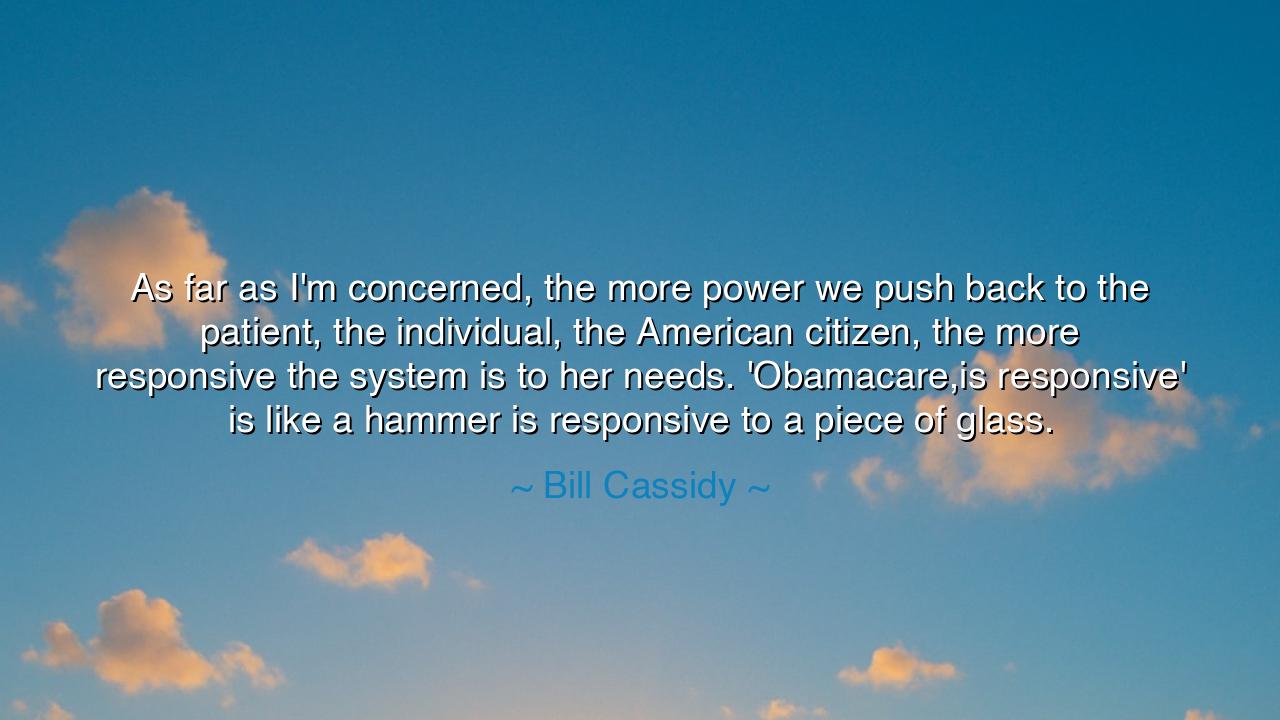
As far as I'm concerned, the more power we push back to the
As far as I'm concerned, the more power we push back to the patient, the individual, the American citizen, the more responsive the system is to her needs. 'Obamacare,is responsive' is like a hammer is responsive to a piece of glass.






In this statement, Bill Cassidy speaks of the sacred balance between power and freedom, especially in the realm of health and governance. He declares that the more power is pushed back to the patient, the individual, the American citizen, the more responsive and just the system becomes. His words echo the ancient truth that those who live under a system should have the greatest say in how it serves them. When power is concentrated in distant hands, compassion fades and bureaucracy grows cold. To Cassidy, centralized systems such as Obamacare act not as healers, but as instruments of control, indifferent to the human beings they were meant to serve.
His comparison — “Obamacare is responsive like a hammer is responsive to a piece of glass” — is striking and vivid. A hammer cannot nurture or mend; it can only shatter. In the same way, Cassidy argues that a rigid, top-down health care system does not respond gently to the needs of individuals but instead crushes them beneath its weight. This image reminds us that systems of governance, if not built with humility and flexibility, can become blunt tools of destruction rather than instruments of service.
History provides many lessons of this kind. In the days of the Roman Republic, the Senate was meant to represent the people, but as power grew centralized in the hands of emperors, the voices of ordinary citizens were silenced. This led to decadence, rebellion, and ultimately the empire’s fall. Similarly, during the founding of the United States, the framers of the Constitution sought to limit centralized power, ensuring through checks and balances that no single force could dominate the people. Cassidy’s words stand firmly in this tradition, calling for a return to local control and personal responsibility.
By emphasizing the patient as the heart of the system, Cassidy speaks to a deeper philosophical truth: health care is not merely a matter of policy, but of human dignity. A patient is not a statistic or a number on a form; she is a living soul, with unique needs and fears. When decisions about her health are made far away, by those who do not know her, the system fails its most sacred purpose. Power, therefore, must flow outward — from the halls of government to the hands of the people.
Thus, this reflection becomes a teaching for future generations. Whether in health care or any other realm, freedom and responsiveness are born when power resides closest to the individual. Systems must be built like healing hands, not crushing hammers — flexible, compassionate, and deeply human. Cassidy’s warning is a call to vigilance: to guard against the arrogance of centralized authority, and to remember that the strength of a nation lies not in its institutions alone, but in the dignity and empowerment of its citizens.






QKphan vo quoc khanh
While Bill Cassidy's criticism of Obamacare as 'responsive' is thought-provoking, I feel his argument misses an important point: not every patient has the same understanding of how to navigate the complex healthcare system. How do we ensure that putting more power in the hands of individuals doesn’t lead to confusion, especially for those who are most vulnerable? Is it possible to strike a balance between empowering patients and maintaining an effective, responsive system?
CEhoc voi cho em
Cassidy’s analogy of Obamacare being like a hammer to glass seems extreme, but it does point to a broader critique of a one-size-fits-all healthcare system. However, my concern is whether giving individuals more control would make healthcare more equitable. If some people are more informed than others, wouldn't the imbalance in access and resources still be a problem? How do we ensure that personal power does not lead to further inequality?
Kkhoa
I understand Bill Cassidy’s frustration with Obamacare and his call for more control to be given back to individuals. However, I can't help but wonder: would giving more power to patients actually improve healthcare outcomes, or could it lead to an even more fragmented and inefficient system? Could a more coordinated approach offer a better solution for those who need healthcare the most, without being as complex and fragmented?
TDPham Thuy Dung
Bill Cassidy’s statement about pushing power back to the patient makes an interesting point about decentralizing healthcare. It makes me wonder, though, if empowering individuals without sufficient support might lead to confusion or inequality. While individual choice is important, can the system truly meet diverse needs when there are so many disparities in resources and access? How do we balance personal choice with the collective responsibility of the healthcare system?